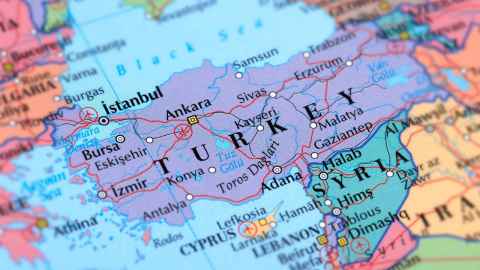Revoking citizenship just global NIMBYism
23 February 2021
Opinion: Australia revoked the citizenship of a dual citizen labelled a terrorist has made the woman an NZ problem. John Ip argues the move is legalised NIMBYism.

Last week, news broke that New Zealand-born woman Suhayra Aden had been detained with her surviving two children (aged five and two) near the Syrian border by Turkish authorities, who labelled her an Islamic State terrorist. She now faces the prospect of being deported to New Zealand - despite having not lived in New Zealand since childhood, and despite her family residing in Australia. Just how did this happen?
Aden left New Zealand aged six to live in Australia, and she eventually became an Australian citizen. In 2014, she reportedly travelled on her Australian passport to join the Islamic State. She was known to both Australian and New Zealand authorities, and the question of which country ought to be responsible in the event of her capture had been discussed by Prime Ministers Jacinda Ardern and Scott Morrison.
However, Ardern was subsequently informed that Australia had revoked Aden’s citizenship, leading to the prospect of Aden’s deportation to New Zealand. Ardern expressed her disappointment, stating that she was “tired of having Australia export its problems”. Morrison responded that he was simply putting Australia’s national security first and that Aden’s citizenship had been automatically revoked under Australian law.
Underlying this diplomatic stoush is the phenomenon of citizenship deprivation for counterterrorism purposes, which some states have employed to bar the return of so-called foreign terrorist fighters - in essence, individuals who travel overseas to participate in an armed conflict with a terrorist group. In this case, by stripping Aden of her citizenship, Australia makes her New Zealand’s problem (since she is no longer legally entitled to return to Australia), while avoiding the international law prohibition on rendering people stateless (since she still has New Zealand citizenship).
Two provisions of the Australian Citizenship Act that were in force between December 2015 and September 2020 automatically revoked the citizenship of dual citizens aged 14 years or over if they engaged in various terrorism-related activities, served in the armed forces of a country at war with Australia, or fought for, or were in the service of, a declared terrorist organisation. These provisions operated automatically; no actual decision was needed to revoke citizenship. As soon as the person engaged in the specified conduct, the revocation occurred - as if by magic. In contrast, further action, such as the cancellation of a passport, requires official action.
From the standpoint of administrative fairness and accountability, these automatic provisions are deeply problematic. The practical obstacles to challenging the revocation of citizenship are daunting - not least because there was no ministerial decision to challenge, but also because notice that revocation had occurred could be lawfully delayed for several years. These provisions are also problematic from the standpoint of legal certainty. Since these provisions did not depend on any Australian official even being aware of the conduct triggering the loss of citizenship, it can be unclear who had actually had their citizenship revoked and when.
Take Aden’s case as an example. She reportedly travelled to Syria in 2014. But beyond her having three children to two Swedish men (both deceased), little is known about what she did there. If (as I think most likely) Aden’s citizenship was revoked because she was in the service of a declared terrorist organisation, she would have lost her Australian citizenship on or after May 6, 2016, the date the declaration that Islamic State was a terrorist organisation became effective. (As an aside, if the foregoing analysis is correct, Aden’s eldest child, reportedly aged five, would remain an Australian citizen by descent.)
The leader of the opposition, Judith Collins, suggested the Government has been outmanoeuvred by the Australian government and should have revoked Aden’s citizenship first. However, the only New Zealand legal provision that might have applied to Aden requires that she voluntarily acquired the citizenship of another country and acted in a manner contrary to the interests of New Zealand. She must also have done these things “while a New Zealand citizen and while of or over the age of 18 years and of full capacity”. So in order for this provision to be applicable, Aden would have had to have acquired Australian citizenship only as an adult. Moreover, deprivation of citizenship requires a ministerial decision that is rightly subject to judicial scrutiny. Set against the Australian provisions that automatically revoke citizenship at the point in time specified conduct occurs, there was never much prospect of New Zealand winning this race to the bottom.
Dual citizenship offered Australia an easy out in Aden’s case; the law automatically revoking her citizenship conveniently obfuscated responsibility (the Australian government has, unsurprisingly, not drawn attention to its power to exempt a person from losing citizenship under these provisions). But Aden is just one instance of a broader phenomenon. The Syrian civil war attracted tens of thousands of foreigners, among them women. There are thousands of women, often with children, who find themselves in a similar situation to Aden. In the end, citizenship deprivation is a form of legalised NIMBYism with dual citizens as objects, and as such, is neither a sustainable nor internationally responsible way of addressing the problem.
John Ip is an Associate Professor in the Faculty of Law where he teaches and researches on law and counterterrorism.
This article reflects the opinion of the author and not necessarily the views of the University of Auckland.
Used with permission from Newsroom Revoking citizenship just global NIMBYism 23 February 2021.
Media queries
Alison Sims | Research Communications Editor
DDI 09 923 4953
Mob 021 249 0089
Email alison.sims@auckland.ac.nz